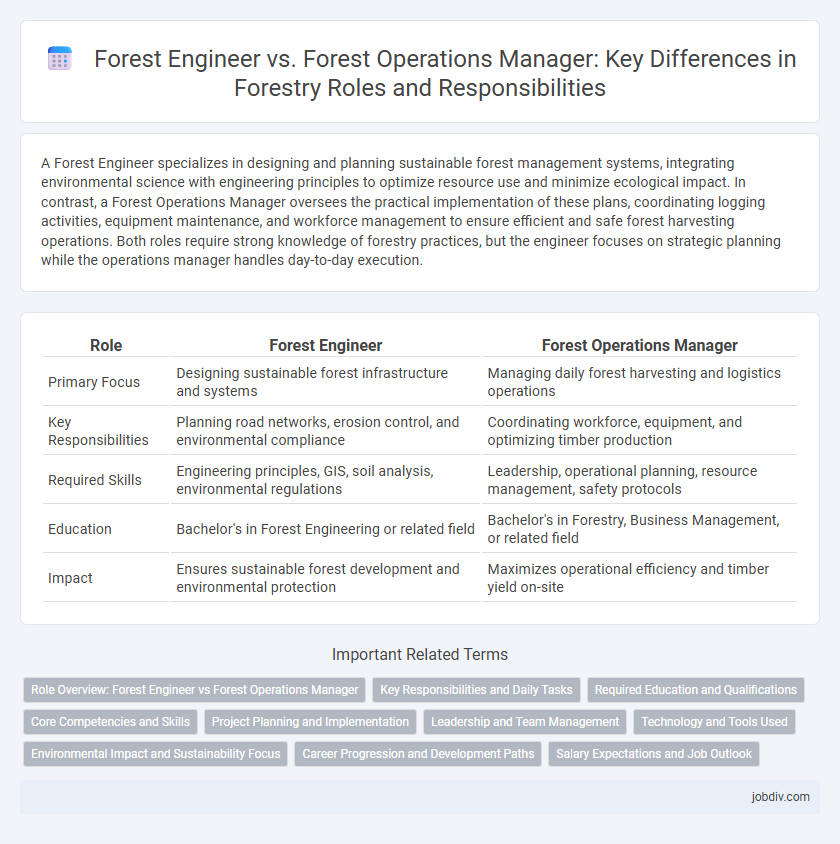A Forest Engineer specializes in designing and planning sustainable forest management systems, integrating environmental science with engineering principles to optimize resource use and minimize ecological impact. In contrast, a Forest Operations Manager oversees the practical implementation of these plans, coordinating logging activities, equipment maintenance, and workforce management to ensure efficient and safe forest harvesting operations. Both roles require strong knowledge of forestry practices, but the engineer focuses on strategic planning while the operations manager handles day-to-day execution.
Table of Comparison
| Role | Forest Engineer | Forest Operations Manager |
|---|---|---|
| Primary Focus | Designing sustainable forest infrastructure and systems | Managing daily forest harvesting and logistics operations |
| Key Responsibilities | Planning road networks, erosion control, and environmental compliance | Coordinating workforce, equipment, and optimizing timber production |
| Required Skills | Engineering principles, GIS, soil analysis, environmental regulations | Leadership, operational planning, resource management, safety protocols |
| Education | Bachelor's in Forest Engineering or related field | Bachelor's in Forestry, Business Management, or related field |
| Impact | Ensures sustainable forest development and environmental protection | Maximizes operational efficiency and timber yield on-site |
Role Overview: Forest Engineer vs Forest Operations Manager
A Forest Engineer designs and implements sustainable forest management plans emphasizing infrastructure development, road construction, and environmental impact mitigation. A Forest Operations Manager oversees daily forestry activities, coordinating logging, harvesting, and workforce management to ensure operational efficiency and regulatory compliance. Both roles require expertise in forest ecology, but the engineer focuses on technical planning while the manager handles practical execution.
Key Responsibilities and Daily Tasks
A Forest Engineer focuses on designing sustainable forest harvesting plans, conducting environmental impact assessments, and optimizing road construction for efficient timber extraction. A Forest Operations Manager oversees day-to-day logging activities, coordinates workforce schedules, ensures compliance with safety regulations, and manages resource allocation for ongoing forest projects. Both roles emphasize sustainable forestry practices but differ in engineering design versus operational management.
Required Education and Qualifications
A Forest Engineer typically requires a bachelor's degree in forestry engineering, natural resource management, or a related field, with strong skills in environmental science, data analysis, and sustainable forest design. A Forest Operations Manager often holds a degree in forestry, business administration, or resource management, complemented by experience in project management, logistics, and regulatory compliance. Both roles benefit from certifications such as Certified Forester (CF) or Project Management Professional (PMP) to enhance qualifications and career prospects.
Core Competencies and Skills
Forest Engineers specialize in designing sustainable forest management plans, utilizing expertise in soil science, hydrology, and geographic information systems (GIS) to optimize resource conservation and environmental impact. Forest Operations Managers focus on coordinating timber harvesting, workforce management, and compliance with safety regulations, emphasizing skills in logistics, project management, and operational efficiency. Both roles require strong knowledge of forestry principles, but Forest Engineers prioritize technical analysis and environmental assessment, while Operations Managers excel in executing and overseeing field operations.
Project Planning and Implementation
Forest engineers specialize in designing and planning sustainable forest management projects, utilizing geographic information systems (GIS) and remote sensing technologies to optimize timber harvest and conservation efforts. Forest operations managers focus on executing these plans by coordinating field activities, managing resources, and overseeing compliance with environmental regulations to ensure efficient and safe project implementation. Both roles integrate project planning and implementation to balance ecological sustainability with operational productivity in forest management.
Leadership and Team Management
Forest Engineers specialize in planning and designing sustainable forestry operations with strong technical knowledge, while Forest Operations Managers emphasize leadership and team management to coordinate field activities and ensure efficient resource use. Effective Forest Operations Managers utilize communication skills and conflict resolution to lead diverse teams, optimize workforce productivity, and implement safety protocols. Both roles require collaboration, but Forest Operations Managers prioritize workforce motivation and supervision to meet operational goals.
Technology and Tools Used
Forest Engineers primarily utilize Geographic Information Systems (GIS), remote sensing technologies, and computer-aided design (CAD) software to plan sustainable forest management and infrastructure projects. Forest Operations Managers focus on technology that optimizes timber harvest operations, such as fleet management systems, automated harvesting equipment, and real-time logistics tracking tools. Both roles leverage advanced data analytics and digital mapping to enhance forest resource monitoring and operational efficiency.
Environmental Impact and Sustainability Focus
Forest engineers specialize in designing sustainable forest management plans that minimize environmental impact through advanced techniques in erosion control, habitat preservation, and reforestation. Forest operations managers coordinate and oversee timber harvesting and land-use activities, ensuring compliance with environmental regulations and implementing best practices to promote sustainability. Both roles contribute to ecosystem health, but forest engineers emphasize planning and design, while operations managers focus on execution and operational efficiency.
Career Progression and Development Paths
Forest Engineers typically start with technical roles involving forest planning, environmental assessment, and resource management, progressing towards specialized expertise in sustainable forestry and ecosystem engineering. Forest Operations Managers advance from supervisory positions managing logging crews and equipment to strategic leadership roles, overseeing large-scale operations, budgeting, and compliance. Career development for Forest Engineers often involves gaining certifications in forest mensuration and GIS, while Operations Managers benefit from experience in logistics, safety regulations, and operational efficiency.
Salary Expectations and Job Outlook
Forest Engineers typically earn an average salary ranging from $60,000 to $85,000 annually, with opportunities increasing in regions emphasizing sustainable forestry and environmental management. Forest Operations Managers command higher salaries, often between $75,000 and $110,000, reflecting their leadership roles in coordinating large-scale timber harvesting and production activities. Job outlook for both professions remains positive, driven by growing demand for sustainable resource management and advancements in forestry technology.
Forest Engineer vs Forest Operations Manager Infographic

 jobdiv.com
jobdiv.com